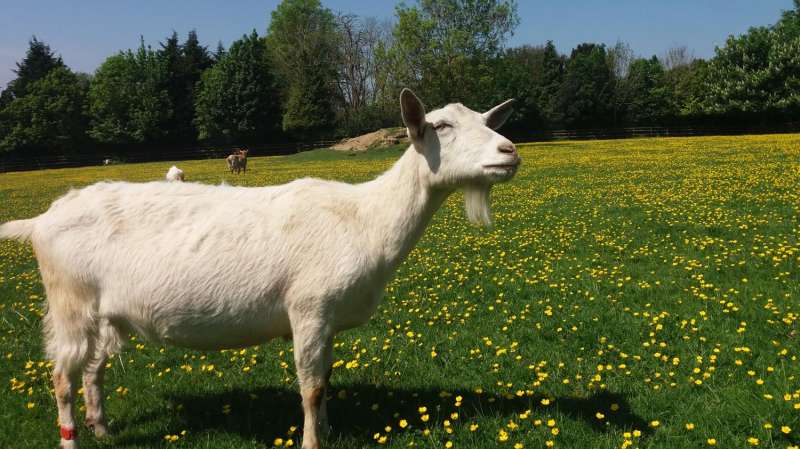Could goats become man's best friend?

Goats have the capacity to communicate with people like other domesticated animals, such as dogs and horses, according to scientists from Queen Mary University of London (QMUL).
In a new paper in the journal Biology Letters, researchers from QMUL's School of Biological and Chemical Sciences found that goats respond to people by gazing at them when facing a problem they cannot solve alone, and their responses change depending on the person's behaviour.
To investigate, the team trained goats to remove a lid from a box to receive a reward. In the final test, they made the reward inaccessible and recorded their reaction towards the experimenters, who were either facing the goats or had their backs to them.
Goats redirected their gaze frequently between the inaccessible reward and human experimenters. They also gazed towards a forward facing person earlier, more often and for longer compared to when the person was facing away.
First author Dr Christian Nawroth, said: "Goats gaze at humans in the same way as dogs do when asking for a treat that is out of reach, for example. Our results provide strong evidence for complex communication directed at humans in a species that was domesticated primarily for agricultural production, and show similarities with animals bred to become pets or working animals, such as dogs and horses."
The research indicates that the domestication of animals has a much broader impact on human-animal communication than previously believed. For example, it's thought that the capacity of dogs to perceive information from humans is the result of changes to the brain from becoming a companion animal through domestication.
"Goats were the first livestock species to be domesticated, about 10,000 years ago," said lead author Dr Alan McElligott from the School's Department of Biological and Experimental Psychology.
"From our earlier research, we already know that goats are smarter than their reputation suggests, but these results show how they can communicate and interact with their human handlers even though they were not domesticated as pets or working animals."
The researchers hope the study will lead to a better understanding of how skilled livestock are in their aptitude to solve problems and interact with humans based on their cognitive abilities - and to an improvement in animal welfare in general.
More information: Goats display audience-dependent human-directed gazing behaviour in a problem-solving task, Biology Letters, rsbl.royalsocietypublishing.or … .1098/rsbl.2016.0283
Journal information: Biology Letters
Provided by Queen Mary, University of London

















